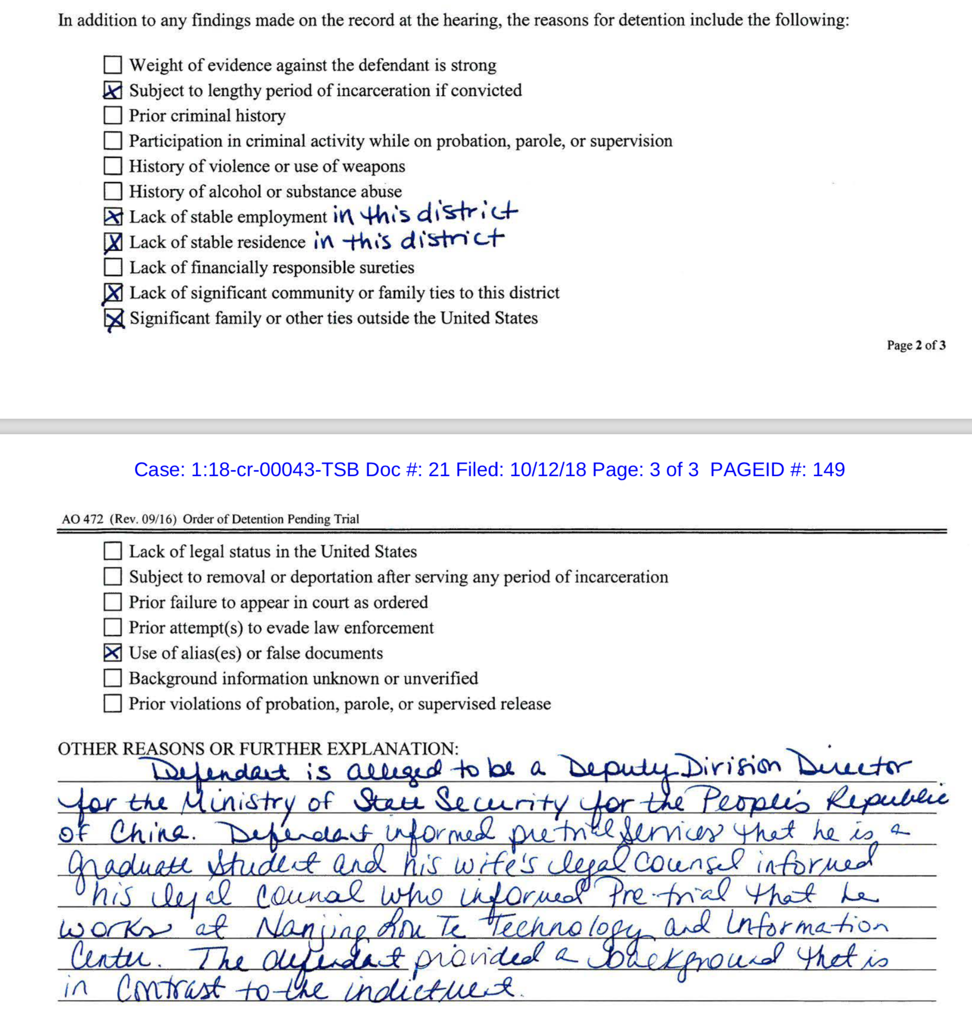
US court keeping accused Chinese spy jailed over use of alias ahead of pretrial hearings
- The defendant ‘provided a background that is in contrast to the indictment’, the US magistrate judge said
- Xu Yanjun is accused of seeking ‘to steal trade secrets from a US company that leads the way in aerospace’
A US federal court is keeping an alleged Chinese spy in jail ahead of pretrial hearings because the defendant is sticking to what federal prosecutors say is a false alias.
US Magistrate Judge Stephanie Bowman of the district of Southern Ohio said the defendant, Xu Yanjun, “provided a background that is in contrast to the indictment”, according to court documents made public this week. Other reasons Bowman decided Xu is a flight risk include his lack of a residence or “significant community or family ties” in the US.
Xu, who also uses the names Qu Hui and Zhang Hui, was extradited to the US with help from Belgian authorities for seeking “to steal trade secrets and other sensitive information from an American company that leads the way in aerospace”, Assistant Attorney General for National Security John C. Demers said in a Justice Department announcement last week.
The formal complaint alleges that Xu is a senior officer with China’s Ministry of State Security (MSS) and has represented himself as an associate of Jiangsu Science & Technology Promotion Association to obtain trade secrets from US companies including GE Aviation, according to court documents.
Other court documents in the case say Xu has passed himself off as an employee of Nanjing Science and Technology Association.
Responsible for intelligence gathering and conducting investigations on issues related to interaction between Chinese and foreign entities, MSS is roughly equivalent to America’s National Security Agency and Central Intelligence Agency.
Xu is a deputy division director with the organisation’s Jiangsu provincial division, according to the complaint.
Bowman’s pretrial detention order said Xu represented himself to US authorities as a graduate student while his wife’s lawyer informed the defendant’s US defence lawyers – Jeanne Marie Cors and Ralph Kohnen of the law firm Taft, Stettinius and Hollister – that Xu is employed by “Nanjing Lou Te Technology and Information Centre”.

Cors has argued against pretrial detention in the US for Xu, citing his lack of a passport and the ease with which US authorities can monitor him.
“Xu’s family – his wife and 10-year-old son – have applied for and obtained visas and are preparing to relocate to the United States to be with Mr Xu pretrial,” Cors wrote in a motion to the court.
“These are simply not the actions of a defendant who intends to flee. Nor would flight out of the country be possible given that Mr Xu’s passport was seized in Belgium and is in the hands of the United States government.
Nor has the government explained why detention to prevent risk of flight is warranted in light of the myriad tools this court and the government have available to monitor Mr Xu’s movements.”
Cors and Kohnen did not respond to queries sent to them via email and voicemail, asking for clarification about Xu’s employer.
The extradition of Xu, which the Justice Department called an “unprecedented” operation, was a joint effort of the Federal Bureau of Investigation’s Cincinnati Division, the FBI Legal Attaché’s Office in Brussels, and Belgian law enforcement officials.
Xu, who is confined to a federal prison in Milan, Michigan, pleaded not guilty in federal court in Cincinnati on October 12. He could be given a prison sentence of up to 25 years in addition to fines if charged and convicted.


